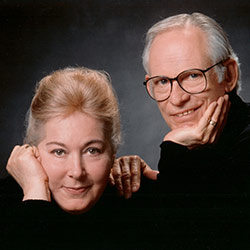
Rhapsody in Blue – Fascinating Rhythms
January 27-28, 2024
Alan Bergman, and the ‘timeless’ story of ‘Visions of America’
When Alan and Marilyn Bergman were approached by photographer Joseph Sohm and composer Roger Kellaway to write song lyrics for Sohm’s “Visions of America” photo-symphony, a musical outgrowth of Sohm’s epic coffee table book, it took very little time and thought to say yes.
“Joe’s book is wonderful and beautifully done, and Roger is a wonderful composer,” says Alan, one half of one of the most acclaimed lyricist-duos in popular music history. “And the subject is timeless. We always need to tell the story of how important America and democracy are to the world.”
In the 15 years since the Bergmans collaborated with Sohm and Kellaway to produce and present their acclaimed project, “Visions of America” has been seen, enjoyed and appreciated by thousands, including record audiences at its West Coast premiere in January 2013, performed by New West Symphony.
Now led by Artistic and Music Director Michael Christie, New West Symphony will perform an updated “suite” version of “Visions of America” on January 27 and 28, 2024. And its relevance remains, maybe more today than ever.
“Oh, it’s very important today,” says Alan, now 98 and still composing songs for stage presentations. “In America, it’s important to reinforce who we are, how we feel, and what we represent to the world. Democracy is not to be taken for granted, it’s to be nurtured, and some of those concepts about what democracy is have been lost or misplaced over the years.
“‘Visions of America’ reinforces how beautiful it is here, how lucky we are to be part of it, and how we share responsibility for keeping democracy alive and healthy.”
That sentiment is clearly expressed in “We the People,” one of five songs on which the Bergmans and Kellaway collaborated for “Visions of America”:
Just as the Earth needs sun and rain to live,
Freedom needs all the love that we can give.
Guarding it ev’ry day,
So we can safely say,
No one will ever take it away.
“Visions,” of course, is not the first time the Bergmans have created song lyrics for a film project. Over the course of six decades, their work earned them three Oscars: for the songs “The Windmills of Your Mind” with Michel Legrand and “The Way We Were” with Marvin Hamlisch, and the score for “Yentl” with Legrand. Another 13 of their songs earned Oscar nominations, including three in one year (1983).
“The Way We Were” also earned the Bergmans two Grammys and a Golden Globe, and the list of their honors and achievements — including induction into the Songwriters Hall of fame in 1980 — is nearly as long as their list of songs. Those include such Great American Songbook standards as “Nice ‘n’ Easy,” “You Don’t Bring Me Flowers,” “What Are You Doing the Rest of Your Life?” and “The Summer Knows.”
Given that both were born in the same Brooklyn hospital (in different years) and earned music degrees, it was perhaps inevitable that Alan and Marilyn would join forces in work and in life. They were married in 1958 and stayed together as songwriting and life partners until Marilyn’s passing from respiratory failure in January 2022.
While he certainly misses his wife and songwriting collaborator, Alan has remained active as a songwriter. “I write every day,” he says with a smile. “I may be 98, but I still love doing it.”
Most recently, he contributed a song to Josh Ravetch’s new off-Broadway musical opening in January 2024, “Beverly Johnson: In Vogue,” the story of the first black model to appear on cover of Vogue.
“It’s a wonderful story,” notes Alan, “and Marilyn and I worked with Josh previously (on “Chasing Mem’ries: A Different Kind of Musical” in 2017), so I welcomed the chance to work with him again.”
He is proud to have worked with many leading music composers of the last half century. Among them: Henry Mancini, Dave Grusin, Cy Coleman, Johnny Mandel, John Williams, Quincy Jones, Neil Diamond and, of course, Roger Kellaway.
“Marilyn and I first worked with Roger many years ago on an album for Carmen McRae,” recalls Alan. “It was a great pleasure, and we were happy to work with him again on ‘Visions of America.’”
For the latter, he says, “Joe and Roger told us, ‘Write what you feel, no limitations.’ They wanted descriptive songs that conveyed an overall image: that not only we can all be great, we can work together to make each other great.”
That is, certainly, a key lesson for those who experience “Visions of America,” says Alan.
“I hope,” he says, “that audiences who attend will digest it, teach it to their children and their friends, and always tell the story of how important America and democracy are to the world.”
